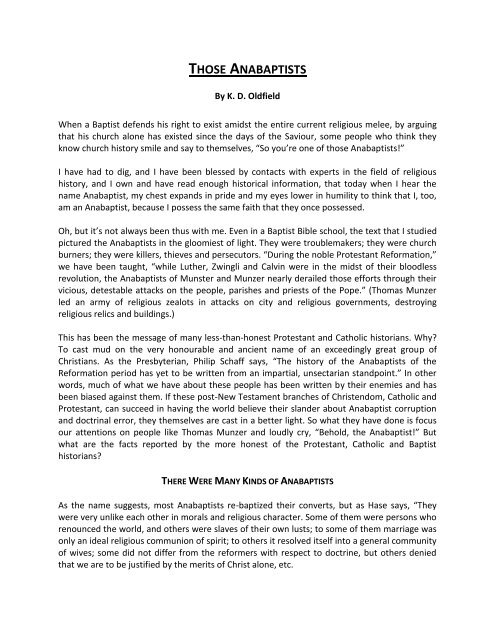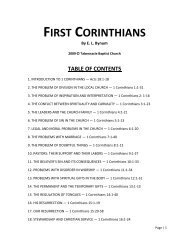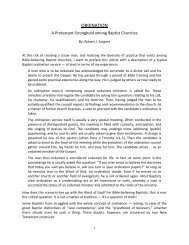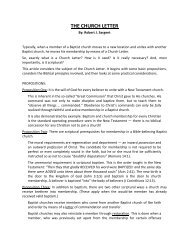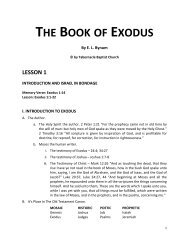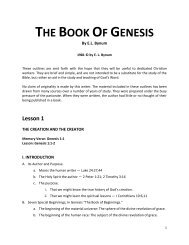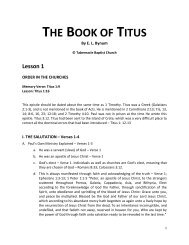THOSE ANABAPTISTS - Tabernacle Baptist Church
THOSE ANABAPTISTS - Tabernacle Baptist Church
THOSE ANABAPTISTS - Tabernacle Baptist Church
You also want an ePaper? Increase the reach of your titles
YUMPU automatically turns print PDFs into web optimized ePapers that Google loves.
<strong>THOSE</strong> <strong>ANABAPTISTS</strong><br />
By K. D. Oldfield<br />
When a <strong>Baptist</strong> defends his right to exist amidst the entire current religious melee, by arguing<br />
that his church alone has existed since the days of the Saviour, some people who think they<br />
know church history smile and say to themselves, “So you’re one of those Anabaptists!”<br />
I have had to dig, and I have been blessed by contacts with experts in the field of religious<br />
history, and I own and have read enough historical information, that today when I hear the<br />
name Anabaptist, my chest expands in pride and my eyes lower in humility to think that I, too,<br />
am an Anabaptist, because I possess the same faith that they once possessed.<br />
Oh, but it’s not always been thus with me. Even in a <strong>Baptist</strong> Bible school, the text that I studied<br />
pictured the Anabaptists in the gloomiest of light. They were troublemakers; they were church<br />
burners; they were killers, thieves and persecutors. “During the noble Protestant Reformation,”<br />
we have been taught, “while Luther, Zwingli and Calvin were in the midst of their bloodless<br />
revolution, the Anabaptists of Munster and Munzer nearly derailed those efforts through their<br />
vicious, detestable attacks on the people, parishes and priests of the Pope.” (Thomas Munzer<br />
led an army of religious zealots in attacks on city and religious governments, destroying<br />
religious relics and buildings.)<br />
This has been the message of many less-than-honest Protestant and Catholic historians. Why?<br />
To cast mud on the very honourable and ancient name of an exceedingly great group of<br />
Christians. As the Presbyterian, Philip Schaff says, “The history of the Anabaptists of the<br />
Reformation period has yet to be written from an impartial, unsectarian standpoint.” In other<br />
words, much of what we have about these people has been written by their enemies and has<br />
been biased against them. If these post-New Testament branches of Christendom, Catholic and<br />
Protestant, can succeed in having the world believe their slander about Anabaptist corruption<br />
and doctrinal error, they themselves are cast in a better light. So what they have done is focus<br />
our attentions on people like Thomas Munzer and loudly cry, “Behold, the Anabaptist!” But<br />
what are the facts reported by the more honest of the Protestant, Catholic and <strong>Baptist</strong><br />
historians?<br />
THERE WERE MANY KINDS OF <strong>ANABAPTISTS</strong><br />
As the name suggests, most Anabaptists re-baptized their converts, but as Hase says, “They<br />
were very unlike each other in morals and religious character. Some of them were persons who<br />
renounced the world, and others were slaves of their own lusts; to some of them marriage was<br />
only an ideal religious communion of spirit; to others it resolved itself into a general community<br />
of wives; some did not differ from the reformers with respect to doctrine, but others denied<br />
that we are to be justified by the merits of Christ alone, etc.
“They were called Anabaptists, not because they were the same denomination, but solely<br />
because they rejected all baptisms not administered by themselves” (W. A. Jarrel). Dr. Ludwig<br />
Keller, the Munster archivist, and a Lutheran, said, “The name Anabaptist, which is used to<br />
designate alike all the South German societies, generally awakens the conception of a party<br />
homogeneous and of like religious views. The conception, however, is an entirely erroneous<br />
one. Among the so-called Anabaptists, retaining here the usual designation, we must<br />
distinguish three principle parties which come upon the scene in three epochs, under the<br />
preponderating influence of different personalities.” “Anabaptists: The English and Dutch<br />
<strong>Baptist</strong>s do not consider the word as applicable to their sect. It is but justice to add that the<br />
<strong>Baptist</strong>s of Holland and England and the United States are to be regarded essentially distinct<br />
from those seditious and fanatical individuals” (Fessenden’s Encyclopedia). That is, depending<br />
on which kind of Anabaptists the historian was studying he could reach all sorts of conclusions<br />
as to who and what kind of people they were.<br />
MUNZER WAS NOT AN ANABAPTIST<br />
Thomas Munzer has been called an Anabaptist, but he so widely differed with the mainline<br />
Anabaptist and also the Scriptures in general that the name does not fit him (Gieseler).<br />
“Munzer was opposed to the <strong>Baptist</strong>s. Differing from them, he practiced infant baptism twice a<br />
year, christening all born in his congregation” (Armitage). Dr. Rule says, “He performed a<br />
ceremony on baptized persons which they mistook for baptism, and by which his followers<br />
received the designation Anabaptist. But...they taught doctrines fraught with important errors,<br />
partly founded of Pelagianism, partly Unitarianism, partly Mysticism (he saw visions), and partly<br />
impure principles.” Vedder says that the fanatical outbreaks in South Germany were instigated<br />
by Thomas Muntzer [sic.] who is invariably called an Anabaptist, but in reality never belonged<br />
to that body. It is true that he wrote and spoke against the baptism of infants, but he regularly<br />
practiced it, and was therefore a Pedobaptist. The disorders of his leadership cannot be laid to<br />
the charge of the Anabaptists. “It is certain that the disturbances in the city of Munster were<br />
begun by a Pedobaptist minister of the Lutheran persuasion...that he was assisted in his<br />
endeavors by other ministers of the same persuasion” (New American Encyclopedia). Luther,<br />
himself, however, divorced himself from Munzer and also from the Anabaptists, whom he<br />
considered a different body.<br />
<strong>ANABAPTISTS</strong> DIDN’T APPROVE OF MUNZER<br />
The ancient and Scriptural Anabaptists did not approve of Thomas Munzer, the Munster<br />
insurrection or the Peasant’s War, nor did they as a body participate. Says Jarrel, “One of the<br />
<strong>Baptist</strong> martyrs, Dryzinger, in 1538, only three years after the craze, was examined as to<br />
whether he and his brethren approved of these vile proceedings. He answered, ‘They would not<br />
be Christians if they did.’ Hans of Overdam, another martyr, complained of these false<br />
accusations of violence. He said: ‘We are daily belied by those who say that we defend our faith<br />
with the sword, as they of Munster did. The Almighty defend us from such abominations.’
Erasmus said of them in 1529: ‘The Anabaptists have seized no churches, have not conspired<br />
against the authorities, nor deprived any man of his estate and goods.’ Dr. Buckland, of<br />
Rochester Theological Seminary quoted Hase, Gerard, Gieseler, Fusslin, Brandt, and Dorner and<br />
concluded that the consensus of candid, critical historians clear the Anabaptists of the Munster<br />
slander.”<br />
Yes, I am not ashamed to be called an Anabaptist. And although, just as there are <strong>Baptist</strong>s today<br />
who are only <strong>Baptist</strong> in name and not doctrine, there were Anabaptists who were heretics; as a<br />
whole they were people of God, making up the true New Testament churches of that period.<br />
We owe them our respect and our opposition to the slander that they so often receive.<br />
(Originally Published April 1984)


